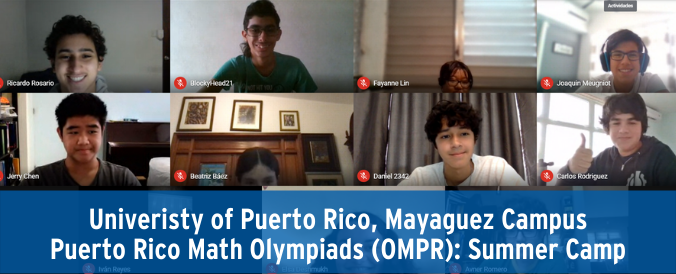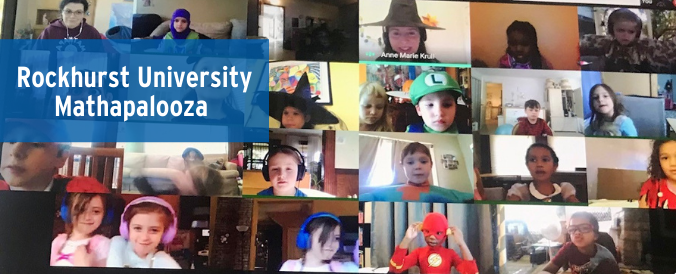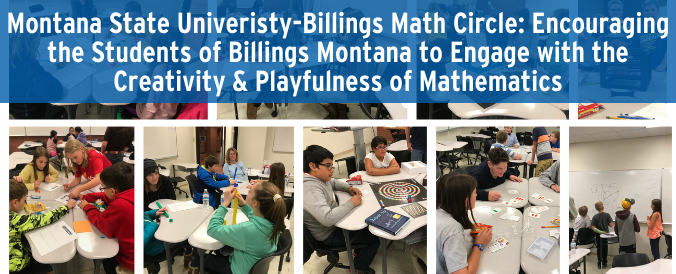- About MAA
- Membership
- MAA Publications
- Periodicals
- Blogs
- MAA Book Series
- MAA Press (an imprint of the AMS)
- MAA Notes
- MAA Reviews
- Mathematical Communication
- Information for Libraries
- Author Resources
- Advertise with MAA
- Meetings
- Competitions
- Programs
- Communities
- MAA Sections
- SIGMAA
- MAA Connect
- Students
- MAA Awards
- Awards Booklets
- Writing Awards
- Teaching Awards
- Service Awards
- Research Awards
- Lecture Awards
- Putnam Competition Individual and Team Winners
- D. E. Shaw Group AMC 8 Awards & Certificates
- Maryam Mirzakhani AMC 10 A Awards & Certificates
- Two Sigma AMC 10 B Awards & Certificates
- Jane Street AMC 12 A Awards & Certificates
- Akamai AMC 12 B Awards & Certificates
- High School Teachers
- News
You are here
Dolciani Mathematics Enrichment Grants
The Mary P. Dolciani Halloran Foundation has provided funding for the Mathematical Association of America (MAA) to award grants for projects designed to develop mathematical enrichment programs for students who show promise or interest in middle school or high school. The goal of the program is to interest students who are ready for more challenge in the study of mathematics and encourage them to further their mathematical studies.
Proposals are sought from college and university mathematical sciences faculty establishing projects that actively engage middle or high school students beyond the standard curriculum, possibly working in partnership with middle or high school math teachers. Interested middle and high school teachers are strongly encouraged to seek out college and university mathematical sciences faculty in the formulation of proposals to benefit middle and high school students. The Foundation is particularly interested in projects originating from the middle or high schools. Proposed projects may replicate existing successful projects, adapt components of such projects, or be new.
About the Program How to Apply Previous Awardees Contact Us
About the Program
Projects should provide enrichment and extension activities for students which lead to heightened interest in and appreciation of mathematics. The projects should encourage students to continue studies of mathematics in high school and college and should better prepare them for those studies. Projects are designed to provide active enrichment activities, beyond classroom coursework, for students who show promise or interest in mathematics and are not intended for remedial help for students who need assistance in order to succeed in their coursework in mathematics. Projects must be open to all students who show promise or interest in the applicant pool. Undergraduate and graduate students may provide role models and work directly with students under the tutelage of faculty from both the college or university and middle or high school. Participating in the DMEG Projects should benefit graduate, college, and pre-college students.
Active engagement in doing mathematics and mentoring of each student participant are essential features. Whenever possible, students should be made aware of career opportunities in mathematics and mathematically intensive disciplines.
Projects should be conducted over a sufficient period of time to engage student participants in learning and applying new and interesting mathematics that they will not otherwise encounter in their classes. Projects may be conducted during summer, during the school year, on weekends, or after school. The Dolciani Halloran Foundation funding may be used to supplement existing enrichment programs in order to increase the number of students participating in those programs or may be used to initiate new projects. Program funding is restricted to activities that are not typically part of school budgets.
Sample Projects
- Organize a club for middle school or high school students interested in mathematics or mathematics and science
- Develop a Math Circle for middle or high school students
- Conduct a summer mathematics camp for middle and/or high school students
- Establish a program for college/university undergraduate and/or graduate students to mentor middle or high school students working on mathematics projects or competitions
- Organize a speaker series for middle or high school students on mathematical enrichment topics and career opportunities using mathematics
- Actively engage mathematically promising or interested students in a way they have not been in school
- Organize a project that connects promising or interested students with a problem based on real applications in industry
- And more!
Nature of the Grant
Grants will be up to $5,000 and will be made to the college or university of the project director for a one-year project. However, short-term events (one to three days) are generally limited to $3,500. An institution is expected to supply in-kind support as an indication of commitment to the project; these grants will not support any institutional indirect costs or provide fringe benefits. Any matching funds available should be described in the proposal and included in the budget justification. To provide maximum flexibility, unexpended funds may be carried forward with approval. Some grants may be renewed up to a maximum of three total years of funding. Projects that have received previous funding must include a report on outcomes of the project.
How to Apply
To apply for an MAA DMEG Grant you must submit an application through Amplifund, our online application portal. You will need to create a free account within the Amplifund system. If awarded, this account will be used to administer your award, so please be sure to enter all of your contact information correctly. We will notify applicants of their status at the end of April.The application portal for 2024 is now closed.
Before starting the application, you will have the opportunity to download the full application to gain insight into all the information that will be required for a successful application. We encourage applicants to do this before applying.
Getting Started with Amplifund
Get started with Amplifund by watching this video. You will learn about setting up an account, completing an application, and submitting an application.
How to Create an Amplifund Account
On the "Application Details" page, click "Apply". On the next screen, click "Register". Enter the information as requested, and read and accept the terms and conditions. You may now complete your application.
Who May Apply
Applications will be accepted from college and university mathematical sciences faculty at accredited U.S. (including U.S. Territory), or Canadian AUCC-member institutions. Applicants are encouraged to demonstrate a partnership with secondary or middle school mathematics faculty that is appropriate for the project. Either the middle or high school teachers or the college or university faculty may initiate the project and teachers are encouraged to develop ideas and to contact colleagues at a nearby two- or four-year college or university to work collaboratively. However, a college or university must be the fiscal agent.
Find answers to some of our most commonly asked questions here.
Characteristics of Effective Projects
While projects will have a high degree of variability, there are some characteristics that effective projects will share:
- Distinct, fresh, and innovative
- Target middle or high school students who are highly motivated or show promise;
- Clearly articulated and measurable project objectives;
- Strong academic component beyond the standard K-12 curriculum, with a focus on enrichment;
- Actively engage students in the activity and in mathematics;
- A clearly defined activity that engages students in the process, structured in a way to have a positive impact on the student;
- Highly competent project team;
- Provide information on careers that use mathematics extensively in a way that will encourage students to pursue mathematical study;
- Use of appropriate role models;
- Evaluation plan that tracks participants and goals of the project;
- Institutional commitment.
Projects may also include mentoring of student participants, involvement of parents, teachers, and counselors, or a peer support system. Please read our DMEG testimonials here.
Application Requirements
The Mary P. Dolciani Halloran Foundation has provided funding for the MAA to award grants for programs designed to encourage pursuit and enjoyment of mathematics among middle school and/or high school students. A proposal for a project may be submitted to only one of the following MAA grant programs in a given year: the DMEG program; the Tensor SUMMA program; or the Tensor Women and Mathematics program. Multiple proposals from the same department or institution (each for a different project and with a different project team) may be submitted in the same year.
Please be prepared to include the name and mailing address of a Financial Officer in charge of this grant. The Financial Officer should be a person in your institution who will accept the award check for this grant, ensure that the funds are available to the project team, and help the Project Director with preparing the final expenditure report on the project. At most institutions, this is someone in the Sponsored Programs Office. Please discuss this project with your sponsored programs office or grants office before applying.
Make sure you have the following documents ready as separate PDF files as you will be asked to upload them in appropriate sections of your application:
- CVs of Project Director and any Co-Directors (2 page limit per CV);-
- A Proposal Narrative, as specified below;
- Letter(s) of Recommendation from your department chair or other appropriate administrator indicating institutional support of the project and other relevant documents.
- A document detailing your institution’s commitment: Describe the ways your institution will support the project, the planned financial and/or in-kind support, and the potential for long-term continuation of the project. What is the likelihood of securing local or state funding after the initial DMEG funding?
Renewals
If the project is a renewal, please be prepared to state the year or years that funding was previously granted and upload a two-page (maximum) summary of progress to date, including the number of participants, successes, and a budget summary of money expended to date.
Proposal Narrative
The following guidelines should be addressed in the order (5 page limit):
- Concept: Describe the mathematical and educational concepts and activities that form the basis for the project. Include a description of the activities, the frequency, how many students are expected to participate, how the project will attract students with talent or interest, how students will be selected, who will oversee the project, and who will lead the activities. Specify the intended audience and how participants will be recruited; projects must be open to all students who show promise or interest in mathematics. Provide details on the type of mathematics and topics covered and how students will be actively engaged.
- Objectives: List the objectives and how they will be achieved by the project
- Project Timeline: Include a timeline of significant project activities, including tracking participants if it is planned.
- Evaluation: Describe how you will judge the success of the project. If this project has run before, please provide details on the number of students, assessment of the project, and how the DMEG funds would be used to expand or enhance the project.
- Institutional Commitment/Sustainability: Describe the ways your institution will support the project and/or the potential for long-term continuation of the project. What is the likelihood of securing local or state funding after the initial DMEG funding?
Project Budget
During the course of the online application, you will be asked to submit a proposed budget for your project. There will be a fillable budget template for you to complete. Each line item in your budget will have a section for you to include comments to explain the cost of the item and why it is necessary for the project's activities. Proposals that focus spending on project participants are found more favorable.
Frequently Asked Questions
First, check with your grants office to see if your institution already has an AmpliFund account from a previous grant. If not, yes, you will need to create a free Amplifund account in order to apply.
The exception to this would be if your institution already has an Amplifund account. Amplifund is the grants management system for many organizations, not just MAA, so it is possible that your institution’s grants office, or sponsored programs office, has an account for your institution already. If that is the case, please contact that office directly.
On the Opportunity Details page, you will see a button that says “Apply” in the upper right of the screen. Click on “Apply” and then click “Register” on the next screen. You will be asked to enter some information about yourself and your organization (note: for academic institutions please select “Other” as organization type), and then you will be asked to accept the terms and conditions. Once this is complete, you may begin your application.
When setting up your Amplifund account you will be asked for your organization name and type. This organization will be the fiscal agent for the grant you are applying for (usually a college/university). For organization type, most academic institutions should select “Other” unless they are applying as a Foundation or Corporation. If you’re unsure, please contact your grants or sponsored programs office.
No, each institution/college/university should only create one account that everyone should use to apply. We suggest that you contact your grants or sponsored programs office directly to coordinate this.
This should be the title of your project, i.e. “[University Name’s] Math Circle” or “Girls Doing Math Camp”, etc.
Yes! At any point while you’re filling out the application form you can download the application in its entirety. Additionally, before submitting, on the final screen there will be a button that says “Review” with a download arrow. Click on this button to download your completed application before submitting.
Amplifund has a built-in safety feature to prevent applicants from missing sections. Each page/section of the application needs to be “Marked as Complete” in order for the system to register that it is in fact complete. There is a button at the bottom of each page/section called “Mark as Complete”. Make sure you have clicked this on each page (when clicked, the button becomes “Mark as In Progress”).
You will receive a confirmation email at the email address you used to create your Amplifund account.
Funding for all four programs is limited, and the MAA will make every attempt to support a broad range of projects from various geographic locations. If any department is interested in submitting more than one proposal, we strongly recommend discussing this internally; the proposals must support different programs and must have different personnel.
No, they don’t need to be MAA members. While project personnel credentials are a factor in making a funding decision, their MAA membership status does not affect their chances of getting a grant.
CV is limited to two pages per EACH of the project co-directors.
Your budget may not pay for release time for faculty. It is assumed that this will be covered by your university as in-kind contribution. Summer salary, however, is a permitted expense.
DMEG supports short-term events, however, support for short-term events (one to three days) is generally limited to $3,500.
We do expect some matching funds from your college or university, but this can be in-kind contribution, such as in the form of materials, office supplies, use of space, etc. They need not match dollar-for-dollar. The matching funds requirement is meant to indicate your institution’s support for your project. Indirect cost (also called Facilities and Administrative Rate, or F&A Rate) is the mechanism used to reimburse a university for the infrastructure support costs associated with sponsored research and other sponsored projects. The F&A rate is essentially an overhead rate. DMEG does not support indirect costs.
Applications will be accepted from college and university mathematical sciences faculty at accredited U.S. (including U.S. Territory) or Canadian institutions.
Program Contacts
For additional information, please contact MAA Programs or Dolciani Mathematics Enrichment Grants Program Director Zsuzsanna Szaniszlo.









